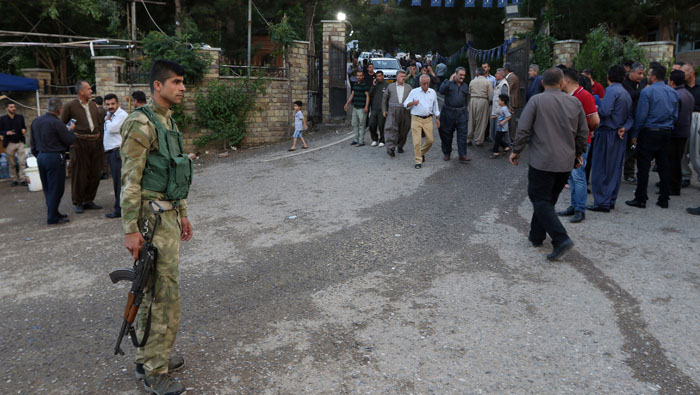
Kirkuk/Sulaimaniya: No sooner had polls closed in Iraq's Kurdish city of Sulaimaniya that anger at an unexpected sweep for its maligned dominant party boiled over.
Gunfire between rival militias quickly erupted.
The nighttime clashes had subsided by Sunday morning as Iraq's election commission tallied the final results of a nationwide legislative vote. But Kurdish opposition parties, backed by their gunmen, demand another vote amid accusations of fraud.
In this climate, many fear that Iraq's northern Kurdish-majority areas might turn into a factional battleground.
The clashes in Sulaimaniya, heartland of the Iran-allied Patriotic Union of Kurdistan party (PUK), were an immediate sign of internecine struggles that are feared after Iraq's first election following the defeat of IS.
After the Saturday vote Prime Minister Haider Al Abadi appears marginally ahead in a tight race.
The Shiite premier, a rare ally of both the United States and Iran, is trying to fend off powerful Shiite groups that could pull Baghdad closer to Tehran.
Some 200 miles (322 km) north of the Iraqi capital, the Kurdish areas are caught in a somewhat different dynamic.
New Kurdish parties hoped to exploit discontent with a political elite accused of gambling away 27 years of hard-fought autonomy in a failed bid for independence last year.
Veteran PUK leader Jalal Talabani, who served as Iraqi president, died last year, and the KDP's Masoud Barzani has been weakened since the catastrophic independence referendum that he championed.
But initial results show a strong win for the old guard, which the opposition reject outright.
With many voters complaining also of corruption, the new parties were expected to snatch seats from the PUK in Sulaimaniya, and from the Kurdistan Democratic Party (KDP), which rules the wider autonomous Kurdish region from nearby Erbil.
After the shock initial results, the situation in Sulaimaniya was particularly tense.
Veteran politician Hoshyar Zebari, a former Iraqi foreign minister, travelled there from Erbil to mediate.
"Armed groups are currently deployed in force inside the headquarters of the Movement for Change and the Coalition for Democratic and Justice," he told Reuters by telephone.
The two opposition parties had hoped to make gains in the vote.
An initial tally suggested the Movement for Change (known as Gorran) and the CDJ had won three and two parliamentary seats, respectively, with the PUK well ahead on eight.
"If the results were correct, maybe the PUK would have got four seats - maybe," Zebari, a senior KDP leader, said.
"I spoke to all sides. From what they said...it looks like if there is not a (satisfactory) result from this election, they will resort to armed combat on the streets of Sulaimaniya."
During Saturday's clashes, PUK militiamen fired at the Gorran headquarters and Gorran gunmen fired back, Zebari and witnesses said.
A video showed tracer fire hitting the building.
The opposition groups demanded the vote be conducted again in a joint statement on Sunday, threatening "political action" in Baghdad and neighbouring countries if their demands were not met.
The Erbil government urged sides to halt violence and resolve their disputes through official channels such as the election commission.
The PUK has long been the dominant political force in Sulaimaniya, although it rivals the KDP which dominates much of the wider Kurdish region.
Many Kurds accuse both parties of backing down as Iraqi government forces and Shiite militias moved to recapture the oil-rich Kirkuk region in October, bringing it back under Baghdad's control.
Kurdish fighters captured Kirkuk from IS in 2014 after the Iraqi military fled.
With that, the city many Kurds hoped for as capital of an eventual state came under their control for the first time.
But the fatal decision to include Kirkuk in a referendum on Kurdish independence precipitated the advance by the Iraqi army, shattering that dream.
In this atmosphere, many subdued Kurdish voters said they would vote for Gorran and the CDJ, which both splintered from the PUK campaigning on anti-corruption platforms.
Those voters were shocked at the exit polls.
"People put one name in the ballot box and another comes out, it's ridiculous. It's overt fraud," 33-year-old sound engineer Abdullah Kurdi said in Kirkuk.
Opposition officials and some voters said a new electronic voting system was to blame, suggesting it had been rigged by the PUK and the Baghdad government.
"The fraud took place in the ballot boxes, and we're demanding a count by hand. The ruling parties, the KDP and PUK are behind this rigging and behind them are Iran and other countries," CDJ candidate Shirin Mohammed charged.
The PUK denies making deals with Baghdad and Tehran over Kirkuk, and rejected accusations of voter fraud.
"The allegations are false. The election commission has said that the elections were clean," Karwan Anwar, a PUK leader, said.
Iraq's election commission said the new voting system would improve speed an ensure the accuracy of results.
Far from regional politics, ordinary Kurds say the dispute has left them even more disillusioned.
"We voted to change our tired situation and finish with the parties who spread corruption," said Arslan Qader, 55.
"But it looks like things won't change because of this dictatorial mindset. They don't understand that it has to happen through ballots, not bullets."